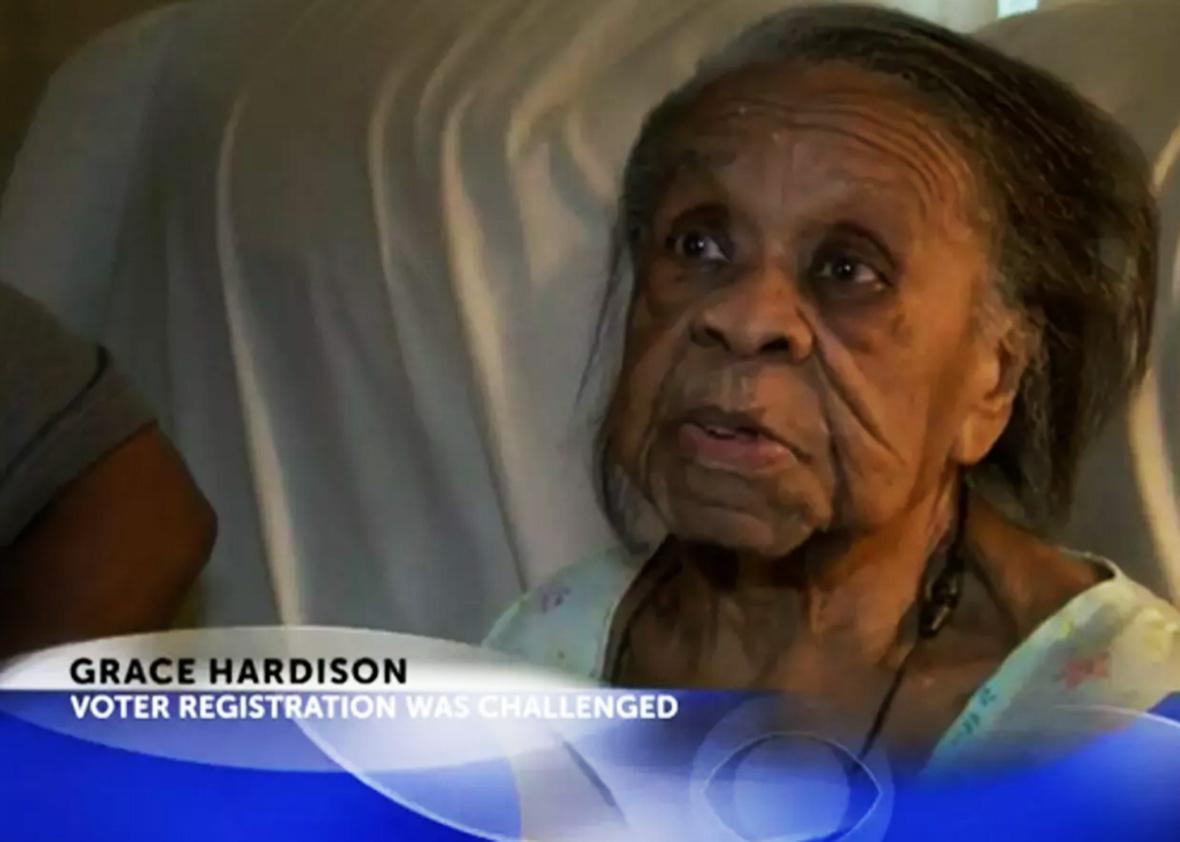Voter suppression doesn’t only happen on Election Day. America is already in the midst of a voter suppression crisis. Voters attempting to cast an early ballot are being thwarted and lied to by Republican officials—a problem that will likely escalate into chaos on election day. This crisis is not unexpected; indeed, it’s been carefully planned by Republican politicians since the turn of this century. In recent months, federal courts have attempted to restore voting rights in states where Republicans restricted or revoked them. But early voting has already proved that these efforts cannot turn around years of careful strategizing and disenfranchisement. The only remaining question is how many qualified voters will have their ballots refused or nullified under illegal Republican regulations.
In North Carolina, Grace Bell Hardison, a 100-year-old black woman, felt the sting of voter suppression. Hardison’s voter registration was challenged in a scheme designed to disenfranchise Democrats in Beaufort County. The county was once required to submit all voting changes to the federal government due to its history of discrimination against minority voting, but the Supreme Court revoked this requirement in 2013. Since then, four individuals, led by Republican Shane Hubers, have attempted to purge 139 voters (most of them black Democrats) from the rolls in Beaufort County by challenging their registration. Voters whose registration is challenged are informed via mail and must appear at a county board of elections or return a notarized form. Otherwise their voting rights are nullified.
Following media attention to her plight, Hardison successfully restored her voting rights. Other North Carolinians were not so lucky. Any registered voter in the state can challenge another voter’s registration; in Moore County, the single person who challenged nearly 400 registered voters just happened to be the secretary of the county Republican Party. Nearly all of them were purged from the voter rolls. Other counties are engaging in the same chicanery; in Cumberland County alone, officials have purged 3,500 people from the voter rolls. They will face no resistance from a legislature and governor who, in the words of the U.S. Court of Appeals for the 4th Circuit, recently passed voting restrictions that “target African Americans with almost surgical precision.” The 4th Circuit blocked many of the worst restrictions from taking effect this election season—but Republican-controlled county election boards have quietly continued to implement them by limiting the number of polling places and slashing early voting.
In Wisconsin, Zack Moore, a 34-year-old black man, faced voter suppression head on. (The linked piece, like the above piece about Grace Bell Hardison, is by Ari Berman of the Nation, who’s been doing remarkable work reporting on voter suppression.) As required under Wisconsin’s stringent new voter ID law, Moore went to the Division of Motor Vehicles to obtain a photo ID to vote, presenting a photo ID from his previous state of residency, a Social Security card, and a pay stub addressed to his home in Wisconsin. It wasn’t enough: The DMV demanded his birth certificate. When he told them it was lost, DMV officials told him to drive to Illinois and obtain a new one. As an alternative, Moore entered the ID Petition Process—which would not provide him an ID before Election Day. Eventually, a federal judge had to intervene to ensure that Moore could acquire the necessary ID. At least 2,200 other Wisconsinites are still waiting on the IDPP to provide them an ID. Countless other Wisconsin voters have already been denied the requisite ID because they lack a birth certificate.
In Texas, Molly E. Neck saw voter suppression in action. When Neck went to vote in San Antonio, she saw a sign declaring that all voters must present a valid ID before casting a ballot. That was simply false: The U.S. Court of Appeals for the 5th Circuit struck down that requirement in August, allowing voters with no ID to sign an affidavit attesting to their identity instead. Texas officials have already been caught violating this ruling by misleading voters about ID requirements in official voting materials, leading a judge to place the state under court supervision. But individual counties continue to falsely inform voters that an ID is necessary to vote. A federal judge ordered Neck’s county to comply with the order and remove the false signs. But there are 254 counties in Texas. Judges and voting rights advocates will not win this game of whack-a-mole; it is inevitable that some voters will continue to be lied to by election officials.
In Indiana, police raided a black voter registration drive on the flimsiest of pretexts and indefinitely halted its operations, blocking as many as 45,000 votes. In Georgia, Republican officials refused to process as many as 100,000 voter registration applications and moved a predominantly black county’s polling precinct from a gym to a sheriff’s office. In Ohio, a federal judge blocked the state’s efforts to purge 2 million people from the rolls—but officials are now refusing to reinstate many of the purged voters.
Of course, it’s not just states and counties unlawfully planning to disenfranchise voters. Political operatives and Donald Trump are currently colluding to intimidate minority voters; the Trump campaign has explicitly boasted of its “major voter suppression” efforts to drive minorities away from the polls. Trump has urged his supporters to become “election observers” at minority-heavy polling places, and they’ve taken the hint: In Ohio, one man explained his plans to engage in “racial profiling” and stop “people who can’t speak American” from casting a ballot.
Democrats have filed a lawsuit to stop this illegal voter intimidation. But even should the lawsuit succeed, why would we expect anyone to obey the ruling? Republican officials have already proved that officials can violate clear court orders with near-total impunity. They can ignore rulings they dislike and suppress minority votes with ease. They can mislead voters, purge them from the rolls, nullify their ballots, and deprive them of IDs. That is a crisis and an outrage. It is also the simple reality of the 2016 election.
